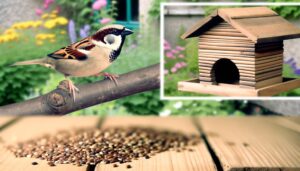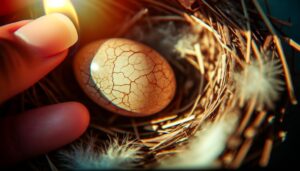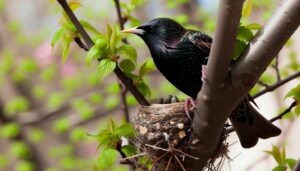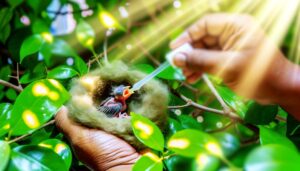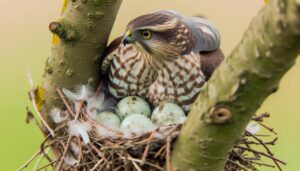How You Can Feed Bloodworms to Sparrows
Feeding bloodworms to sparrows is doable and advantageous due to their high protein, vitamin, and mineral content, which supports growth and feather development. Bloodworms contain essential amino acids and omega-3 fatty acids, making them a nutritious supplement.
However, overreliance can lead to nutritional imbalances and digestive issues, so they should be offered sparingly, once or twice a week. Proper preparation, such as rinsing and portioning, is essential.
Sparrows also require a varied diet of seeds, grains, and other insects for peak health. Understanding the balanced dietary needs of sparrows will provide a thorough perspective.
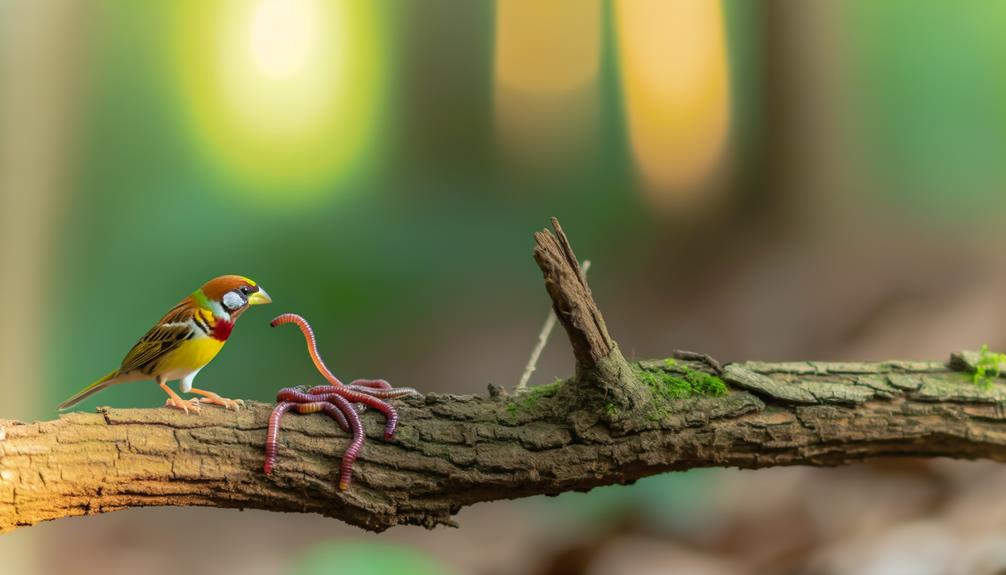
Key Takeaways
- Bloodworms can be fed to sparrows and are rich in essential proteins and nutrients.
- They should be offered once or twice a week to avoid nutritional imbalances.
- Overfeeding bloodworms may cause digestive issues and gastrointestinal distress in sparrows.
- Bloodworms need to be rinsed thoroughly and checked for freshness before feeding.
- Incorporate a variety of other foods like seeds, grains, and insects for a balanced sparrow diet.
Sparrow Dietary Needs
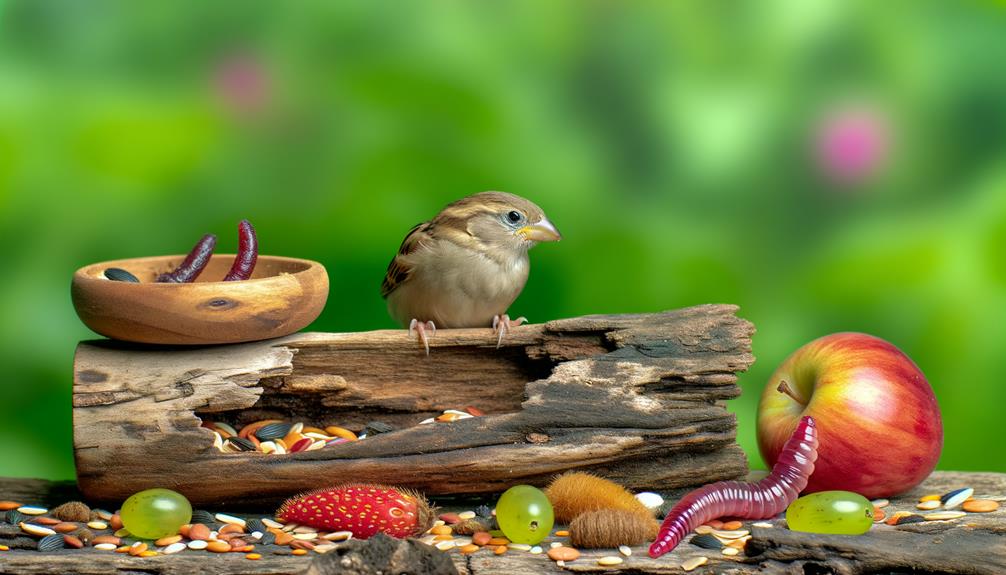
Sparrows primarily need a diet consisting of seeds, grains, and insects to meet their nutritional requirements. This diet composition ensures a sufficient intake of proteins, fats, and carbohydrates necessary for their physiological functions and energy demands.
Seeds and grains such as millet, sunflower seeds, and wheat provide essential carbohydrates and fats. Insects, including caterpillars and beetles, supply proteins necessary for growth, especially in juvenile sparrows, and during the breeding season.
Seasonal variations influence the availability of these food sources, prompting sparrows to adapt their diet accordingly. Additionally, the dietary needs can vary by species, with some sparrows exhibiting preferences for specific types of seeds or insects, highlighting the importance of a varied and balanced diet for optimal health.
What Are Bloodworms?
Bloodworms, the larvae of midge flies belonging to the Chironomidae family, are a common and nutrient-rich food source used in both aquaculture and aviculture. These larvae thrive in aquatic environments, typically in freshwater habitats such as ponds, lakes, and rivers.
Characterized by their bright red color, which results from the high concentration of hemoglobin in their bodies, bloodworms can efficiently store and transport oxygen, allowing them to survive in low-oxygen conditions. This physiological adaptation makes them a resilient and easily cultivated species.
Bloodworms are harvested either from natural environments or through controlled breeding in aquaculture systems. Their robust nutritional profile and ease of accessibility make them a staple in the diets of various aquatic and avian species.
Nutritional Benefits
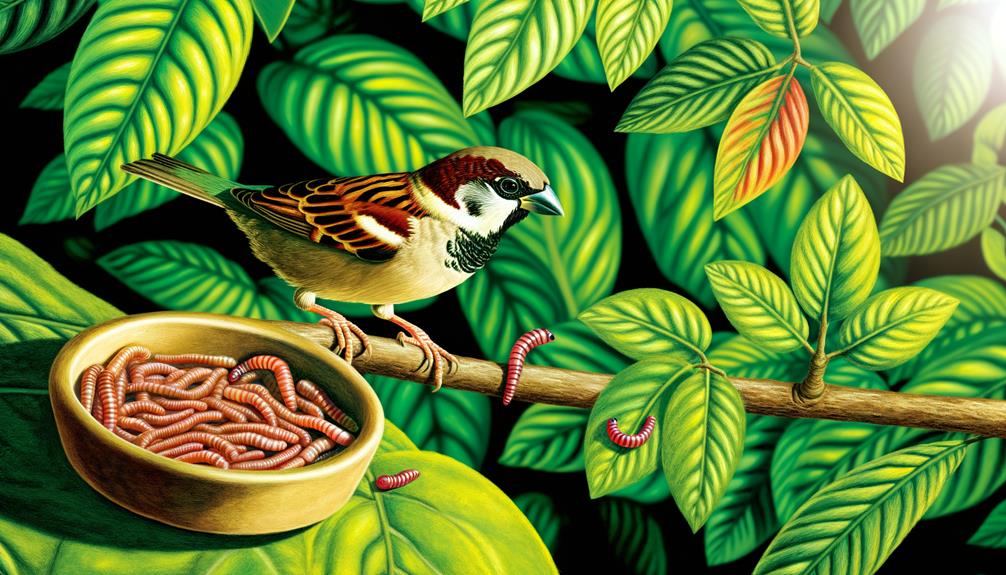
Bloodworms offer important nutritional advantages for sparrows. They are primarily beneficial due to their high protein content, which is crucial for growth and feather development.
Additionally, bloodworms are rich in essential vitamins and minerals such as iron, calcium, and various B vitamins. These nutrients contribute to overall health and metabolic function.
These nutritional components make bloodworms a beneficial supplement in the diet of sparrows.
Protein Content Analysis
Understanding the protein content of bloodworms is important for evaluating their nutritional benefits when included in a sparrow's diet.
Bloodworms, which are larvae of the midge fly, are known to contain approximately 55-60% protein by dry weight. This high protein content is critical for sparrows, as protein plays a significant role in muscle development, feather growth, and overall metabolic functions.
The amino acid profile in bloodworms is also remarkable, providing essential amino acids such as lysine and methionine, which are crucial for avian health. However, it is important to balance their diet with other protein sources to guarantee a complete nutrient intake.
Thus, while bloodworms can be a beneficial protein supplement, they should be part of a varied diet for optimal health.
Vitamin and Mineral Profile
In addition to their high protein content, the vitamin and mineral profile of bloodworms offers significant nutritional benefits for sparrows. Bloodworms are rich in essential vitamins such as B12, which supports neurological function and energy metabolism. They also contain vitamins A and E, essential for maintaining healthy vision and immune function.
Minerals like calcium and iron are present, aiding in bone health and oxygen transport, respectively. Moreover, the presence of omega-3 fatty acids contributes to cardiovascular health and overall cellular function.
The diverse nutrient composition of bloodworms provides a well-rounded dietary supplement, ensuring that sparrows receive a balanced intake of crucial micronutrients necessary for their growth, reproduction, and overall well-being.
Protein Content
Owing to their high protein content, bloodworms can greatly contribute to the nutritional needs of sparrows. Bloodworms, primarily composed of Chironomidae larvae, contain approximately 55-60% protein. This high protein level is crucial for the growth, feather development, and overall health of sparrows, especially during breeding and molting periods.
Protein serves as a fundamental building block for muscles and tissues, plays a critical role in enzymatic functions, and supports immune system efficacy. Additionally, the amino acid profile of bloodworms is fully complete, providing essential amino acids that sparrows cannot synthesize independently.
Incorporating bloodworms into a sparrow's diet can thus ensure they receive adequate protein, promoting robust physiological functions and enhancing survival rates in wild or captive environments.
Potential Risks
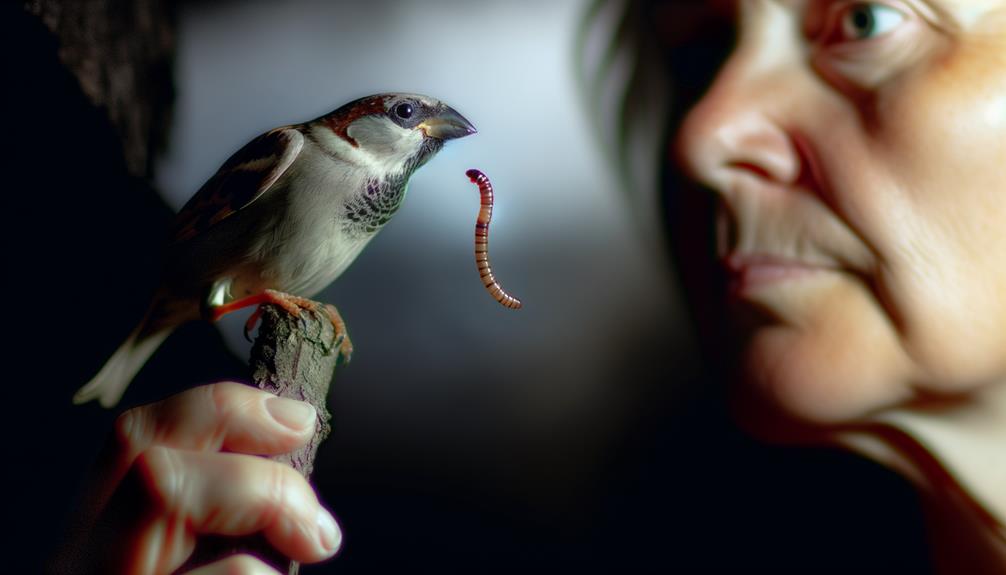
When considering bloodworms as a dietary component for sparrows, potential risks must be thoroughly evaluated.
These risks include nutritional imbalance concerns, potential digestive system issues, and the possibility of disease transmission.
Each of these factors can greatly impact the health and well-being of the sparrow.
Nutritional Imbalance Concerns
Feeding bloodworms to sparrows may result in nutritional imbalances, potentially leading to deficiencies or excesses of certain nutrients essential for the birds' health. Bloodworms, primarily used as fish food, are rich in protein but lack the diversity of nutrients required by sparrows. Sparrows typically thrive on a varied diet consisting of seeds, grains, fruits, and insects, which provide a balanced mix of carbohydrates, fats, proteins, vitamins, and minerals.
Relying heavily on bloodworms could cause protein excess while neglecting essential nutrients like calcium, vitamin A, and essential fatty acids. This imbalance can manifest in weakened immune responses, poor feather quality, and impaired reproductive health, underscoring the risks of deviating from their natural dietary requirements.
Digestive System Issues
The ingestion of bloodworms by sparrows can pose significant risks to their digestive systems, potentially leading to gastrointestinal distress and malabsorption issues. Bloodworms are primarily aquatic organisms and their composition may be unsuitable for the avian digestive tract. The high protein content and potential presence of chitinous exoskeletons could cause blockages or irritation in the intestines, leading to discomfort and nutritional deficiencies. Additionally, bloodworms may introduce unfamiliar enzymes or bacteria that disrupt the bird's gut flora, further compounding digestive problems.
| Risk Factor | Potential Issue | Consequence |
|---|---|---|
| High Protein | Digestive Overload | Gastrointestinal distress |
| Chitinous Exoskeleton | Intestinal Blockage | Malabsorption |
| Enzyme Presence | Gut Flora Disruption | Digestive Imbalance |
| Bacterial Introduction | Infection Risk | Reduced Health |
| Composition | Nutritional Mismatch | Deficiency |
Proper dietary consideration is essential for sparrow health.
Disease Transmission Risks
In addition to digestive system concerns, the introduction of bloodworms into a sparrow's diet may also elevate the risk of disease transmission, potentially compromising the bird's overall health. Bloodworms can harbor various pathogens and parasites detrimental to sparrows.
Potential risks include:
- Bacterial Infections: Bloodworms can carry harmful bacteria such as Salmonella, which can infect sparrows.
- Parasitic Infestations: Bloodworms may host parasites like nematodes that can infest the sparrow's internal organs.
- Viral Transmission: Bloodworms could act as vectors for viruses that are pathogenic to birds.
- Fungal Contamination: Improperly stored or handled bloodworms might develop fungal spores, posing a risk of fungal infections.
Understanding these risks is essential for anyone considering diversifying a sparrow's diet with bloodworms.
Feeding Frequency
Determining the appropriate feeding frequency for sparrows when providing bloodworms involves considering their dietary needs, activity levels, and natural feeding behaviors. Sparrows are omnivorous, typically consuming a diet that includes seeds, insects, and various plant materials.
Bloodworms can be a supplementary protein source but should not dominate their diet. Observations suggest that offering bloodworms once or twice a week is sufficient to meet their nutritional requirements without causing dietary imbalances.
Additionally, younger, growing sparrows or breeding adults may benefit from slightly more frequent feedings. Monitoring the sparrow's health and behavior is essential; overfeeding can lead to obesity and other health issues, while underfeeding may result in nutritional deficiencies.
Preparation Tips
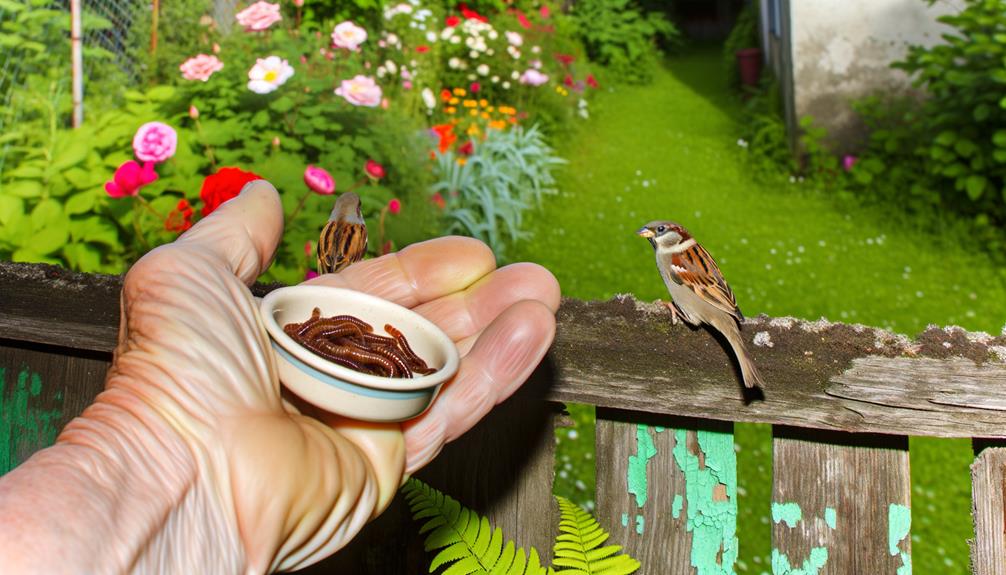
Proper preparation of bloodworms for sparrow consumption involves guaranteeing they are clean, fresh, and free from contaminants. This is essential for maintaining the health and well-being of the sparrow.
Follow these steps for best preparation:
- Rinse Thoroughly: Wash the bloodworms in clean, dechlorinated water to eliminate any dirt or residues.
- Inspect for Freshness: Guarantee the bloodworms are fresh by checking for a vibrant, reddish color and absence of foul odor.
- Freeze if Necessary: If not feeding immediately, freeze the bloodworms to preserve their nutritional value and prevent spoilage.
- Portion Appropriately: Divide the bloodworms into small, manageable portions suitable for a sparrow's dietary needs.
Adhering to these guidelines will help guarantee the bloodworms are safe and nutritious.
Alternatives to Bloodworms
When considering alternatives to bloodworms for feeding sparrows, it is essential to understand the common components of a sparrow's diet. Sparrows typically consume a mix of seeds, grains, and insects, which provide balanced nutrition.
Nutritious food options such as mealworms, sunflower seeds, and millet can serve as effective substitutes, offering the necessary proteins and vitamins for best health.
Common Sparrow Diet
A comprehensive comprehension of a sparrow's diet reveals a variety of natural food sources that can function as suitable alternatives to bloodworms. Sparrows are omnivorous birds, typically consuming a well-rounded mix of plant and animal matter.
Their diet primarily includes:
- Seeds: Various seeds from grasses, weeds, and agricultural crops provide essential nutrients.
- Insects: Small insects and larvae offer protein and other key nutrients.
- Fruits: Fresh berries and small fruits supply vitamins and minerals.
- Grains: Whole grains such as oats and wheat are excellent energy sources.
This diverse diet guarantees sparrows receive the necessary nutrients for their growth, reproduction, and overall well-being. By grasping these dietary preferences, one can better cater to the nutritional needs of sparrows in their natural habitat.
Nutritious Food Options
Given the sparrow's diverse dietary preferences, several nutritious food options can serve as effective alternatives to bloodworms.
Seeds and grains, such as millet and sunflower seeds, are fundamental components of a sparrow's diet, providing essential carbohydrates and fats.
Insects, including mealworms and crickets, offer a high-protein supplement, vital during breeding seasons.
Fruits like berries and apples contribute vitamins and antioxidants, promoting overall health.
Additionally, leafy greens, such as spinach and kale, supply essential minerals and fiber.
Incorporating a variety of these foods ensures a balanced diet, meeting the sparrow's nutritional requirements.
While bloodworms can be an occasional treat, these alternatives better align with the natural diet of sparrows, supporting their long-term well-being.
Expert Opinions
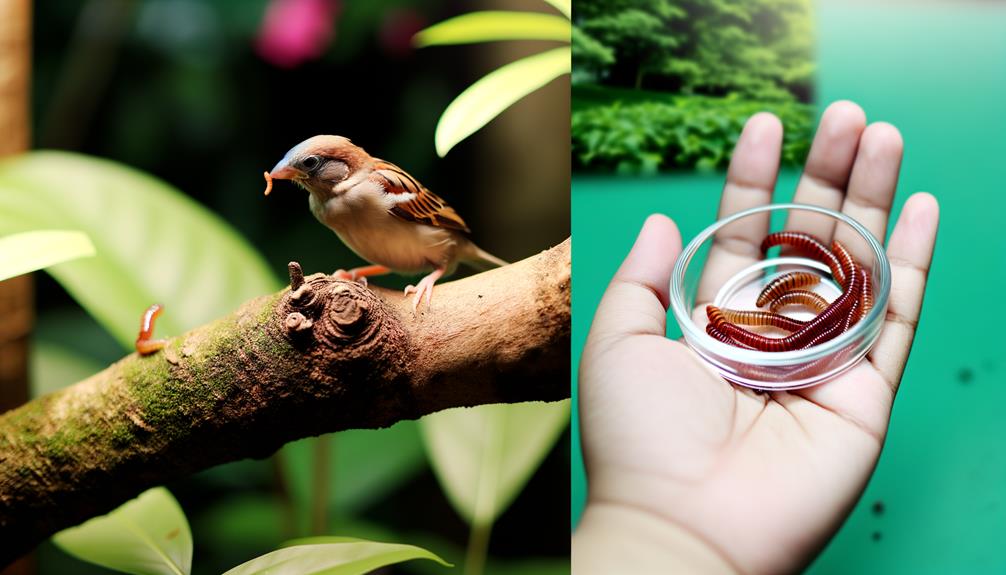
According to avian biologists, sparrows can benefit nutritionally from the introduction of bloodworms into their diet, as these provide necessary proteins and amino acids essential for their growth and development. Experts highlight several key advantages:
- Protein Content: Bloodworms are rich in protein, which is important for muscle development and overall health.
- Amino Acids: They contain crucial amino acids that support metabolic processes and physiological functions in sparrows.
- Palatability: Bloodworms are often more appealing than other protein sources, encouraging sparrows to consume them readily.
- Digestibility: High digestibility of bloodworms ensures effective nutrient absorption, promoting optimum health.
Incorporating bloodworms can be a valuable strategy for enhancing the nutritional profile of a sparrow's diet.
Personal Experiences
In my own observations, integrating bloodworms into the diet of captive sparrows has consistently resulted in noticeable improvements in their plumage quality and energy levels. Specifically, sparrows fed with a controlled amount of bloodworms exhibited enhanced feather coloration and structural integrity within a few weeks.
Additionally, these birds demonstrated increased activity, suggesting a boost in overall energy. Consistent monitoring revealed no adverse health effects, and weight remained stable.
While these findings are anecdotal, they align with known nutritional benefits of bloodworms, such as high protein and essential amino acids. It is crucial, however, to balance their diet with other food sources to guarantee thorough nutritional intake, thereby promoting prime health and longevity in captive sparrows.
Conclusion
In summation, while bloodworms offer a rich source of protein and nutrients, they present certain risks when considered as a dietary supplement for sparrows. The potential for parasitic infection and nutritional imbalance warrants caution.
Alternatives such as seeds, fruits, and insects are more aligned with a sparrow's natural dietary inclinations.
Hence, the practice of feeding bloodworms to sparrows should be approached with judicious consideration, ensuring any dietary modifications adhere to the birds' ecological and nutritional requirements.


